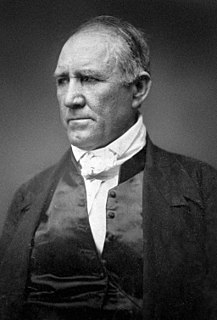Цитата Эзры Тафта Бенсона
Что единственная цель и единственная законная цель правительства состоит в том, чтобы защитить гражданина в пользовании жизнью, свободой и собственностью, и когда правительство берет на себя другие функции, это узурпация и угнетение.
Связанные цитаты
Я верю, что Бог наделил людей определенными неотъемлемыми правами, изложенными в Декларации независимости, и что ни законодательный орган, ни большинство, сколь бы многочисленным оно ни было, не может морально ограничить или разрушить их; что единственной функцией правительства является защита жизни, свободы и собственности, а все, что сверх этого, является узурпацией и угнетением.
Единственная надлежащая, нравственная цель правительства состоит в том, чтобы защищать права человека, что означает: защищать его от физического насилия, защищать его право на собственную жизнь, на его свободу, на его собственность и на осуществление его собственных интересов. счастье. Без права собственности никакие другие права невозможны.
Единственными надлежащими функциями правительства являются: полиция, чтобы защитить вас от преступников; армия, чтобы защитить вас от иностранных захватчиков; и суды, чтобы защитить вашу собственность и контракты от нарушения или мошенничества со стороны других, а также для разрешения споров с помощью рациональных правил в соответствии с объективным законом.
В цивилизованных сообществах собственность, так же как и личные права, является существенным объектом законов, которые поощряют промышленность, обеспечивая пользование ее плодами; та промышленность, из которой возникает собственность, и то наслаждение, которое состоит не только в ее непосредственном использовании, но и в ее посмертном назначении объектам выбора и родственной привязанности. Таким образом, в справедливом и свободном правительстве должны эффективно охраняться права как собственности, так и личности.
Если при моем уходе на скромное положение частного гражданина меня будут сопровождать уважение и одобрение моих сограждан, трофеям, добытым окровавленной сталью, или изодранным флагам палаточного поля, никогда не будет зависти. Забота о человеческой жизни и счастье, а не об их уничтожении, есть первая и единственная законная цель хорошего правительства.
[Вся] вся власть изначально принадлежит народу и, следовательно, происходит от него. Это правительство установлено и должно осуществляться на благо народа; которое состоит в наслаждении жизнью и свободой, в праве на приобретение собственности и вообще в стремлении к счастью и безопасности. Что народ имеет несомненное, неотъемлемое и неотъемлемое право реформировать или менять свое правительство всякий раз, когда оно оказывается несовместимым или неадекватным цели его учреждения.
Правительство имеет три основные функции. Она должна обеспечивать военную оборону нации. Он должен обеспечивать соблюдение контрактов между отдельными лицами. Он должен защищать граждан от преступлений против них самих или их имущества. Когда правительство, преследуя благие намерения, пытается перестроить экономику, узаконить мораль или помочь особым интересам, ценой становится неэффективность, отсутствие мотивации и потеря свободы. Правительство должно быть арбитром, а не активным игроком.
Правительство учреждается для защиты собственности всякого рода; а также то, что заключается в различных правах отдельных лиц, как то, что конкретно выражает этот термин. В этом заключается цель правления, и только такое правительство является справедливым, которое беспристрастно гарантирует каждому то, что принадлежит ему.
Известная, очень часто цитируемая фраза гласит: «Лучше то правительство, которое меньше всего правит». Я не думаю, что это правильное описание функций хорошего правительства. Правительство должно делать все то, для чего оно необходимо и для чего оно установлено. Правительство должно защищать людей внутри страны от насильственных и мошеннических нападений гангстеров, и оно должно защищать страну от внешних врагов. Это функции государства в рамках свободной системы, в системе рыночной экономики.
Я сказал, что одна из причин, которая вызвала больше волнения и недовольства, чем любая другая, заключается в том, что правительство не будет впоследствии и когда это необходимо вмешиваться для защиты рабов как собственности на территориях; и я спросил сенатора, откажется ли он от своих представлений о скваттерном суверенитете и согласится защищать рабов, как и всю другую собственность?
Я вижу ... и с глубочайшим огорчением быстрые шаги, с которыми федеральная ветвь нашего правительства продвигается к узурпации всех прав, зарезервированных за штатами, и консолидации в себе всех полномочий, внешних и внутренних; и это также с помощью конструкций, которые, если они законны, не оставляют ограничений их власти ... Слишком очевидно, что три правящие ветви [федерального правительства] в сочетании лишают своих коллег, органы государственной власти, полномочия, сохраненные за ними, и выполнять все функции, внешние и внутренние.




































